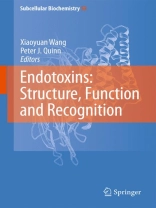Endotoxins are potentially toxic compounds produced by Gram-negative bacteria including some pathogens. Unlike exotoxins, which are secreted in soluble form by live bacteria, endotoxins are comprised of structural components of bacteria. Endotoxins can cause a whole-body inflammatory state, sepsis, leading to low blood pressure, multiple organ dysfunction syndrome and death. This book brings together contributions from researchers in the forefront of these subjects. It is divided into two sections. The first deals with how endotoxins are synthesized and end up on the bacterial surface. The second discussed how endotoxins activate TLR4 and, in turn, how TLR4 generates the molecular signals leading to infectious and inflammatory diseases. The way endotoxins interact with the host cells is fundamental to understanding the mechanism of sepsis, and recent research on these aspects of endotoxins has served to illuminate previously undescribed functions of the innate immune system. This volume presents a description of endotoxins according to their genetic constitution, structure, function and mode of interaction with host cells.
Tabla de materias
I Structure and Properties of Endotoxins.- Endotoxins: Lipopolysaccharides of Gram-Negative Bacteria.- Purification and Characterization of Lipopolysaccharides.- Endotoxins: Relationship Between Structure, Function, and Activity.- The Diversity of the Core Oligosaccharide in Lipopolysaccharides.- Salmonella-Regulated Lipopolysaccharide Modifications.- The Variation of O Antigens in Gram-Negative Bacteria.- Regulators of TLR4 Signaling by Endotoxins.- Membrane Partitioning: Is Location Everything When It Comes to Endotoxin Recognition?.- Infection, Treatment and Immunity.- Endotoxin Detection – from Limulus Amebocyte Lysate to Recombinant Factor C.- The Role of Endotoxin in Infection: Helicobacter pylori and Campylobacter jejuni.- The Role of Pseudomonas Lipopolysaccharide in Cystic Fibrosis Airway Infection.- Development of Small-Molecule Endotoxin Sequestering Agents.- Development of an Anti-Endotoxin Vaccine for Sepsis.- Synthetic and Natural TLR4 Agonists as Safe and Effective Vaccine Adjuvants.- Targeting Endotoxin in the Treatment of Sepsis.- Lipopolysaccharides in Rhizobium-Legume Symbioses.- Lipopolysaccharides and Plant Innate Immunity.












